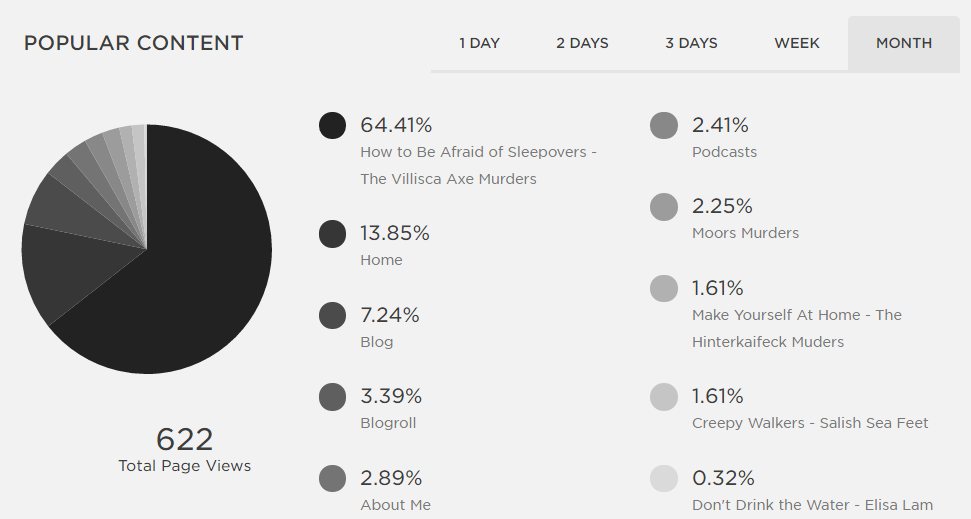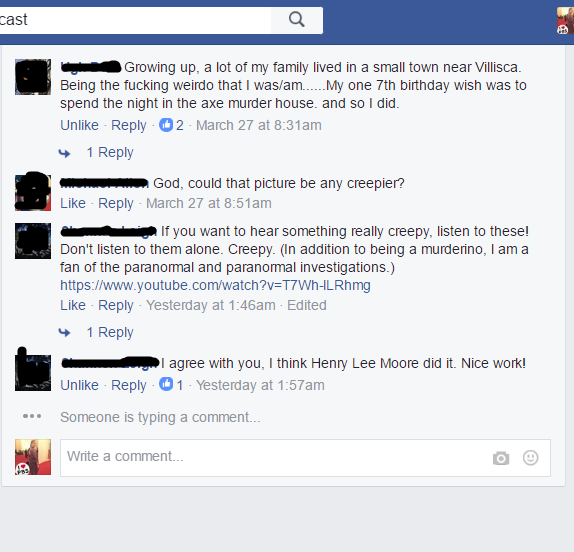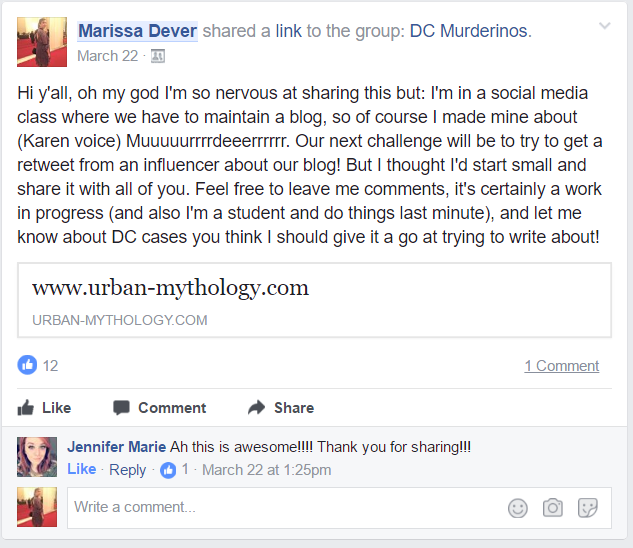The Case of Marissa and the Social Media Skills
Murder? Aren't you not supposed to talk about that? But actually it shows my writing, research, and analysis. Besides, murder is popular now in more than just"if it bleeds, it leads" context.
EXPERT TESTIMONY
Before we get to me using social media, let's talk about me writing about social media
Hopefully I won't be investigating either's murder any time soon...
- Like the ongoing battle of Facebook trying to get ahead of Snapchat
- And Facebook still trying to do that in countries where Snapchat isn't available
- Or Snapchat as a viable source of news
- And a whole lot more in the technological sphere
I can break down big movements in social media and how that will influence business, media, and everyone that consumes it. We can quickly adapt to the big changes from social media, but understanding why the changes happen gives me a better idea of how best to use the new features. I can now hop on Discover on Snapchat for news updates or check Instagram Stories to see a little bit of the behind the scenes for my favorite account.
evidence
But what about using social media? It's all well and good to read about the stuff, but if you can't pick the right choices for the right platform, that knowledge won't do much good.
- Sometimes it's not just about the right hashtag, it's about finding the right group. This blog's analytics went crazy because I posted it in not one, but two, My Favorite Murder fan groups.
Sometimes it's not about finding the right hashtags or mentioning the right people. Social media is all about going where the audiences are and building from there to get them where you want them to go, whether that's other social media or a weird blog about true crime.
DIRECT QUESTIONING
But really, what does maintaining a true crime blog have anything to do with social media? Most of the crimes are from before it even existed!
I've also created an entire social media plan, complete with editorial and content calendars, and I have more graphics experience. But tying things in to mysteries make things more fun!
cROSS EXAMINATION
It's hard to get across internet trends in 140 characters, but tweets can still provide plenty of insights.
Facebook is becoming part of a growing trend #SMPAsocial https://t.co/KkbAUo99l4
— Jack SaFranko (@JSaFranko) April 2, 2017
It's tough being a woman or minority in technology, and Facebook is a part of a larger trend with companies like Verizon and MetLife who are encouraging or requiring more diversity in the legal counsel they use. But what this tweet doesn't reflect is that Facebook as a whole has a workforce that is mostly white and male. So, Facebook's part of a larger trend, but also still part of a persistent, larger problem.
@AshleyLe0214 Anonymity can help and hurt people. There's always arguments for verifying accounts and prohibiting fakes - this is one of them #SMPAsocial
— Eli Ulanet (@EUlanet) April 2, 2017
Twitter went so far as to change their generic avatar for new accounts because they had become the symbol of anonymity and harassment. This student election involved fake and harassing Twitter account and just shows that just because the dirty politics moves to social media, doesn't mean there aren't going to be consequences. A solid strategy can make or break a campaign, but that strategy can't be trolling.
My own article was shared as a sponsored post on my Facebook feed. I guess I am the target audience for my own work. #smpasocial pic.twitter.com/Zc5YCqV5PX
— Marissa Dever (@writer1311) April 12, 2017
Sometimes Facebook ads are just the last thing you searched on Amazon (still disturbing, but a lot of the time, it's stuff you don't care about purchasing if you haven't already), but this really shows how narrowly sponsored posts can find someone. I'm in the area for WETA, I like their page, I love history—especially women's history, and I'm the author. So I'd be very interested. Using the right keywords can make sure the post finds the right person.
Reminds me of Paranormal Activity ad campaign to have people demand it. Not gonna lie, I'm a sucker and am watching now #SMPAsocial https://t.co/pghzrMXbwM
— Marissa Dever (@writer1311) April 9, 2017
Social media also can make the difference in a movie's success. It makes it seem by just watching it on Netflix, or clicking a "Demand it" button people can become involved. It makes them feel like they're a part of the process, giving the social campaign a sense of notoriety to make the social media for the movie spreadable. People take note of the campaign and their sense of involvement, and pass it on to their friends by posting about what they did to help on social media.
If only half a percent of #Facebook users switch over, #Snapchat loses 10% of its potential future users.https://t.co/UG8FS9ATXT #SMPAsocial
— Kyle Chin (@KyleChinner) April 2, 2017
Facebook's been running scared to overtake Snapchat, especially since Facebook missed out on its chance to buy its competitor early on. But this goes past the general fight—this shows the hard numbers. If people switch over, that means brands will switch over, too. They have to follow the audience. And that could really decimate Snapchat.
@glossier's killing it in the business and social game https://t.co/Zt9l8vRh9U #SMPAsocial
— Katrina Kagan (@katrinakagan) March 30, 2017
Ah, everything always looks better on Instagram. But what I see between a Glossier and Instagram partnership is a brand that is perfectly suited for the platform. Instagram makeup is practically it's own style within the beauty community, so Glossier is taking it a step further to make is easier for people to buy the products their drooling over in their feeds. Commerce on Instagram is just the next step in branded content on the photo sharing platform.
We talk about social for brands, but it's also fascinating to look at it as a device for performance art #SMPAsocial https://t.co/oHx4Vf7Vss
— Marissa Dever (@writer1311) April 9, 2017
Social media is a great new opportunity for storytelling for brands, publications, and artists alike. Poppy, a commentary on the pop star corporate machine, utilizes social media to form the art piece. It shows how social media can be used for social commentary. Social media isn't just promotion—it's a vital chance for social commentary.
Snapchat called out Facebook's attempts to copy them on April Fools! Both fun and social strategy #SMPAsocial https://t.co/pYTc2xXMj3
— Marissa Dever (@writer1311) April 2, 2017
Snapchat fired back at all of Facebook's attempts to clone it, clearly not sweating the copies as much as Facebook is desperate to copy them. Snapchat is confident that they're here to stay, despite Facebook, one of the largest companies, is coming after them to copy their platform. They're confident people are happy to stay with them as an important, necessary, and unique platform.
CLOSING ARGUMENTS
There's bigger elements to understanding social media, larger concepts we need to consider while we use it.
There are things we can't change, but we can fight: harassment
It can sometimes be terrifying to post online, especially as a woman. But anyone online can see how it can be a scary place to operate. According to the Pew Research Center, 73 percent of users have seen someone being harassed on social media, and 40 percent have experienced it themselves. The threats vary, men tend to get name-calling and embarrassment, while women tend to get sexual harassment and (the very real crime of) stalking. Online harassment, especially when it blows up like the election I spoke about earlier or like Gamergate did, not only shows how online threats can be considered very real violence, but it also brings to the surface larger issues within culture and society that everyone. As the Washington Post put it:
"In fact, in many respects, Gamergate is just a proxy war for a greater cultural battle over space and visibility and inclusion, a battle over who belongs to the mainstream."
Online harassment is a nasty, dark part of the internet. It's a reminder that the internet isn't all wonderful growth and development. But it also doesn't mean we can lose hope: Online harassment also means that people are using the internet to speak out, and say things the trolls would maybe rather not hear. It emphasizes that social media is a vital opportunity for expression and understanding deeper cultural issues to resolve them.
things we can change and improve upon: Social addiction
I had to take a whole day without social media. It wasn't actually that wild. Generation Like would really like to portray my generation, and maybe the generation below me, as wildly obsessed with getting social media interactions: boosting likes, getting retweeted by our favorite actors, and buying all the products they recommend on social media. What I think it really showed, though, was that people who are online can find a sense of belonging. People find themselves to be a part of larger communities, and they actively want to "work" to maintain their part in those communities—but that can also mean they miss out on the communities that are in person. However, whether it's a man initially missing out on the email to sell his internet start-up or when you can or can't pull out your phone at dinner, a lot of the cases people cite are extreme ones. My whole class disconnected for a day, with varying degrees of impact.
He also uses this great XKCD comic that says pretty much what Hampton explains.
Claude Fischer even argues that there has always been ways that people have disconnected from those around them. He notes that Keith Hampton said:
“‘what a strange practice it is…that a man should sit down to his breakfast table and, instead of conversing with his wife, and children, hold before his face a sort of screen on which is inscribed a world-wide gossip.’ [Sociology founding father] Charles Cooley (1909) on the death of conversation as a result of that evil new technology/practice – the morning delivery of the newspaper.”
If people want to disconnect from those around them, they'll find away. It's all about being aware of how much we are removing ourselves with whatever the latest technology is. Without self-awareness, that's how people can get into those extreme cases.







